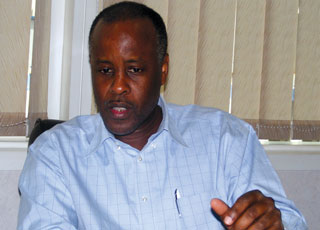
By Patrick Kagenda
Simon Rutega, CEO of the Uganda Security Exchange, tells The Independent’s Patrick Kagenda that the absence of the National Social Security Fund distorts and depresses the long-term funds market
How has the Uganda Securities Exchange been faring under the global economic slowdown?
A global recession will obviously affect Uganda. When liquidity dries up outside, it dries up locally. We have seen foreign portfolio investment slow down.
What does this indicate?
The slowdown means that money coming into the country has reduced, because our taxes depend a lot on imports. Our tax basket has already started reducing, fewer foreigners are investing in our markets, capital flows have fallen, and the exchange rate has gone up, which means imports become expensive.
On the other hand, oil prices are down, which helps. What this all means is that we are not going to attain the growth we otherwise would have done.
How has this affected the financial markets in Uganda?
The impact comes in two forms: the exchange rate and the cost of money going up. There will be no collapse; the Uganda Securities Exchange is looking forward to more products being listed. But we would like to have NSSF back to participate in the market. Its absence has distorted prices. The return of NSSF would constitute a stimulus package for us. We have about three or four issuers of bonds who want to raise long term money in the market but who are waiting for NSSF to come back into the market. There is also a potential equity issue coming, but because of the design of our pension sector, if NSSF is not in the market, we have a problem.
How soon do you expect NSSF to return to the market?
I have seen them come back into the government bond market. I would now urge them to consider the fixed income and the equity markets, especially relating to the Uganda Securities Exchange. That should stimulate the market. The absence of institutions like the NSSF depresses prices, and this is compounded by the foreign portfolio investors that have exited the market. Again, this is a sign that our nation needs to look inward for medium to long-term capital, because when you have a credit crunch like this and you don’t have a vibrant pension, retirement, or life insurance sector, you are less resilient to that shock.
What have you learned from the financial crunch?
You must build your own domestic capital market, you must build medium to long term savings, and you must have a well-functioning pension sector so that when short-term investors exit the market, those who have a long time horizon can correct the market. There are some counters here that are a bargain, and if we had these long-term retirement and pension funds, this would be the time for them to buy these counters. You need to put in place a framework for these long-term investors, because our pension industry here is only worth about $ 1.2 billion. By comparison, Kenya’s is about $ 4.8 billion while South Africa’s is $660 billion. You are only talking about a fund that has probably 200,000 savers out of the 30 million Ugandans. If we have more resilient factors in place, we are able to resist the shock.
Where does the future of the market lie?
The answer is in pension reforms, ensure that there is a pillar where most Ugandans can save; there is private pension funds and life insurance. Until we resolve this issue, we are not going to have a strong financial system.
What is the way forward for USE?
The world has always gone through booms and busts; what is happening now is not new. The lesson is that there should be a balance between regulation, protection and innovation. What happened was that there was too much innovation in those developed markets, and the regulation did not keep up. You need to have well-capitalised financial institutions. In our market, we had not responded to that innovation.
 The Independent Uganda: You get the Truth we Pay the Price
The Independent Uganda: You get the Truth we Pay the Price



